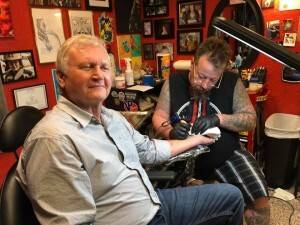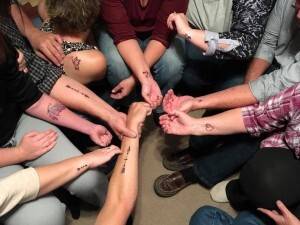What does suicide prevention and a presentation by an anti-modern farming activist from India have in common? You might be surprised…
A “rock star of the GMO protest movement,” Vandana Shiva, delivered a speech Nov. 16 at Drake University in Des Moines. If you aren’t familiar with Shiva’s views, here’s the Genetic Literacy Project’s link to why she is saying such awful things about GMOs.
I was alerted to Shiva’s speech by my friend Cristen Slings Clark, who blogs at Food & Swine. Cristen asked if I could accompany her to this speech, but unfortunately, I was working in southern Illinois at the time. Fortunately, other Iowa farmers and advocates were in the crowd.
 One Iowa farmer challenged activist Vandana Shiva after “myth-filled” anti-GMO lecture during the Q&A session. I read about it in an article posted by the Genetic Literacy Project. That farmer who wrote that piece was my friend Michelle Miller, who goes by “Farm Babe” on social media. Michelle did a terrific job writing the article! Naturally, The Des Moines Register also published an opinion piece about the event by my least favorite writer Rekha Basu. I encourage you to read both articles, as well as do more research on your own. While I don’t share Vandana’s view on modern farming, she talked about another problem in India that is near to my heart and that’s farmer suicide. She claims that the use of GMO seeds has caused thousands of India’s farmers to take their own lives! Extreme stress is felt by many farmers, but I believe GMO seeds ease the burden. It makes me mad that this lady from India is getting rich by giving speeches filled with lies!
One Iowa farmer challenged activist Vandana Shiva after “myth-filled” anti-GMO lecture during the Q&A session. I read about it in an article posted by the Genetic Literacy Project. That farmer who wrote that piece was my friend Michelle Miller, who goes by “Farm Babe” on social media. Michelle did a terrific job writing the article! Naturally, The Des Moines Register also published an opinion piece about the event by my least favorite writer Rekha Basu. I encourage you to read both articles, as well as do more research on your own. While I don’t share Vandana’s view on modern farming, she talked about another problem in India that is near to my heart and that’s farmer suicide. She claims that the use of GMO seeds has caused thousands of India’s farmers to take their own lives! Extreme stress is felt by many farmers, but I believe GMO seeds ease the burden. It makes me mad that this lady from India is getting rich by giving speeches filled with lies!
I agree, however, that suicide is a serious issue worldwide. My family has personally been affected by suicide. If you read my blog regularly, you know that I believe mental healthcare is a real need especially in rural areas. That why last Saturday – when our five kids, 10 grandkids, one great granddaughter and many in-laws gathered to celebrate Thanksgiving – we also got semi-colon tattoos.
Why? One of our daughters suggested we get tattoos and join the growing movement of Project Semicolon that honors the memory of loved ones while raising awareness of mental illness and suicide.
A semicolon is used when an author could’ve ended the sentence but chose not to. “The author is you and the sentence is your life.” Not being a good writer nor a good English student many years ago, I wasn’t even aware of how a semicolon was meant to be used. But getting a tattoo of a semicolon to symbolize a life not finished made sense!
 Nine family members, including me and my wife, had various semicolon designs tattooed on to them last Saturday. The reaction from our kids and grandkids to Grandma and Grandpa getting “tats” made for a very interesting day, but the closeness we felt afterwards and the meaning behind the tats made for a very meaningful Thanksgiving. There were tears shed for our lost family member, but I believe those were healing tears. Farmers are not the only people prone to suicide and mental health stress. Veterans come readily to mind as I’m very concerned about the condition of our returning soldiers. We have family members who have served, so I know military service changes people. Many Americans think of the soldier lost in battle, but returning soldiers often have more problems than the physical harm to their bodies. I’m thankful for all the men and women who have served and for those who continue to serve, so that we may enjoy our freedoms including free speech. I’m also thankful for the technology that allows farmers to feed more families, more efficiently, than ever before. (By the way, The American Farm Bureau Federation’s annual survey of food prices put the average cost of a modest Thanksgiving dinner down about 24 cents from 2015. It costs less than $5 per person to feast on this traditional holiday meal.)
Nine family members, including me and my wife, had various semicolon designs tattooed on to them last Saturday. The reaction from our kids and grandkids to Grandma and Grandpa getting “tats” made for a very interesting day, but the closeness we felt afterwards and the meaning behind the tats made for a very meaningful Thanksgiving. There were tears shed for our lost family member, but I believe those were healing tears. Farmers are not the only people prone to suicide and mental health stress. Veterans come readily to mind as I’m very concerned about the condition of our returning soldiers. We have family members who have served, so I know military service changes people. Many Americans think of the soldier lost in battle, but returning soldiers often have more problems than the physical harm to their bodies. I’m thankful for all the men and women who have served and for those who continue to serve, so that we may enjoy our freedoms including free speech. I’m also thankful for the technology that allows farmers to feed more families, more efficiently, than ever before. (By the way, The American Farm Bureau Federation’s annual survey of food prices put the average cost of a modest Thanksgiving dinner down about 24 cents from 2015. It costs less than $5 per person to feast on this traditional holiday meal.)
In this season of Thanksgiving, let’s also keep in mind the semicolon and what it means for mental health.
